Coronavirus: Homeless help 'like something out of a storybook'
- Published

Amanda said she was "dizzy with all the help" she received at the start of lockdown
Amanda had been sleeping rough on and off for eight years when the coronavirus pandemic began.
When the lockdown was announced, she sought help through a housing charity, which organised accommodation for her at a hotel in Manchester.
The 46-year-old said within an hour she had been transported to the hotel, given an en-suite room and a change of clothes.
"It was like something out of a storybook," she told BBC Radio 5 Live.
"Can you imagine the insecurity of a doorway with an often-wet sleeping bag, people ignoring as they pass you?
"All of a sudden, you have the security of an en-suite room, clean sheets, clean towels, a TV. It was like something that was on a totally other level of the Richter scale."
Amanda, a former sex worker who has struggled with drugs problems in the past, is one of about 5,400 people to have been helped by Everyone In, a government-funded scheme designed to get people off the streets and into emergency accommodation amid the pandemic.

Greater Manchester Combined Authority said it would relaunch its own scheme as a successor to Everyone In, called A Bed Every Night
She said there were various stations set up at the hotel with people on hand to help with things like benefits and medical prescriptions.
"You'd go from one person to another, and by the end of the day you were dizzy with all the help," she said.
"That first night, I slept for two days, and had about 15 showers in 24 hours."
The government distributed over £3.2m to councils in England in March to house homeless people in their areas as the lockdown began.
Funding for the emergency Everyone In scheme is to end, sparking concern from homeless charities such as Crisis, which described it as "completely unacceptable".
The government said it had given councils £3.2bn since March and urged them to keep supporting rough sleepers.
A spokesman for the Ministry of Housing, Communities and Local Government said: "It is simply wrong and misleading to suggest that we have stopped funding to keep rough sleepers off the street.
"We gave councils an initial payment of £3.2m at the start of the pandemic so they could take immediate action and help rough sleepers off the street.
"We have since given councils a further £3.2bn to deal with the immediate pressures they are facing, including supporting rough sleepers."
Greater Manchester Mayor Andy Burnham said: “Of course, Everyone In was never meant to last forever.
"When it comes to an end we will need funding to ensure vulnerable people are not suddenly left without accommodation."
Greater Manchester Combined Authority said it would relaunch its own scheme as a successor to Everyone In, called A Bed Every Night, which aims to spend £4.75m and provide 445 beds across all 10 boroughs.
Reflecting on the future, Amanda said the assistance she had received had achieved in a few weeks what she thought would only be possible in "12 to 18 months".
"We've all got our own stories, but being left alone trying to sort ourselves out, we've gathered momentum. We're finding our own identities now," she added.
The Riverside Group charity, which works closely with Manchester City Council and organised the support for Amanda, has helped many homeless people staying in hotels.
John Glenton, executive director for care and support at Riverside, said: "I think we've made more progress in the last eight weeks than we've made in the previous eight years."
- Published16 May 2020

- Published18 April 2020
